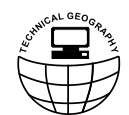Geographia Technica, Vol 14, Special Issue 2019, pp. 39-46
MUNICIPAL WASTE MANAGEMENT CHALLENGE OF URBANIZATION: LESSON LEARNED FROM PHITSANULOK, THAILAND
Sarintip TANTANEE, Suthi HANTRAKUL (Phitsanulok, Thailand)
ABSTRACT: As the world rapidly move toward urban, the most important by-product is the municipal solid waste (MSW). The amount of MSW is growing faster than the rate of urbanization. This posts challenge on environmental sustainability. Poorly managed MSW causes high impact on health, environment and economy. Several cities in Thailand have faced with this problem for decades. The ways of coping with MSW are different from city to city. Phitsanulok is one of the rapidly growing city in lower Northern Thailand. The city put their effort to find the appropriate model for MSW management through the last 20 yr. During 1999 to 2006, the city had received the support from Deutsche Gesellschaft für Internationale Zusammenarbeit, GmbH (GIZ) to do technical research and set various campaigns in MSW management. More than decade, the city had developed their own model on MSW management to reach the goal of being green and clean city. The city initiated the idea of “zero landfill” and set as their target. The model includes not only process of MSW management but also development of community based solid waste management (CBM) training course to disseminate and share their knowledge to other cities including the neighbouring countries.
Keywords: Zero Landfill Policy, Community Based Solid Waste, Municipal Solid Waste, Phitsanulok Model, Mechanical Biological Treatment, Training Course.

 Full article here
Full article here